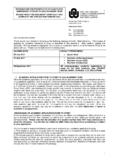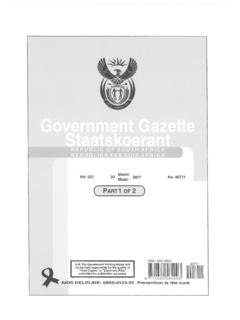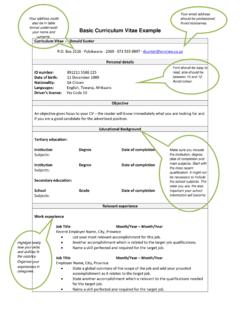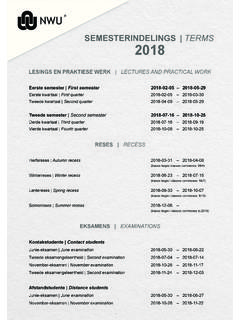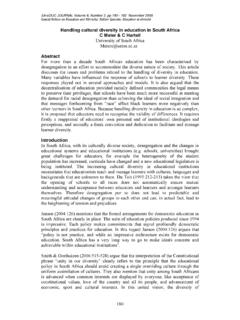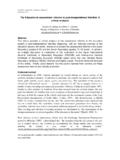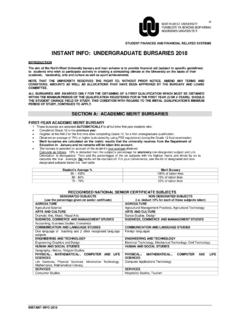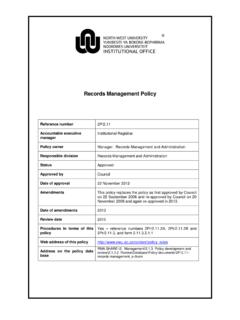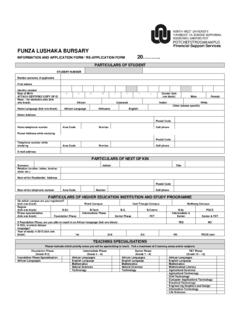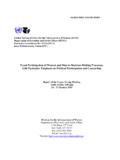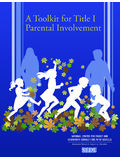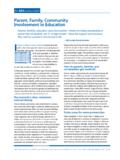Transcription of Learners’ democratic involvement in school governing bes ...
1 SA-eDUC JOURNAL Volume 10, Number 1, March 2013 1 Learners democratic involvement in school governing bodies in South Africa: making the voice of the voiceless heard Abstract This is a qualitative study that used interviews and observations undertaken in two provinces of South Africa. The investigation considered the responses of focus groups of parents, educators and school governing bodies (SGBs) in two provinces of South Africa regarding the issues of both the actual or theoretical involvement of learners in SGBs.
2 It considered what barriers exist to learner participation, the key issue of training for learner involvement , and whether SGBs have contributed to the development of democracy in South African schools. The findings suggest that, despite being afforded a full role in school governance by post-apartheid educational policy, learners do not always play their part in school decision- making . While learner participation in SGBs in South Africa offers considerable potential for both school improvement and for contributing to the deepening and consolidation of democracy in South Africa, much work still has to be done.
3 Keywords school governance, democracy, learner participation, decision- making Introduction and background In recent years a strong argument has been made for democracy as a form of development in itself (Sen, 1999; Walker & Unterhalter, 2007), as well as for providing a better context for other forms of social and economic development (UNDP, 2000: 1- 13, 2005: 20-21). Moreover, education has for a long time been assumed to have the potential to play a part in fostering more democratic states and societies (Carr & Hartnett, 1996).
4 While empirical studies vary in the extent to which they support the relationship between education and democratisation ( Lipset, 1959; McMahon, 1999), a key argument is that it is not necessarily formal education per se that might foster more democratic values and behaviours, but that what matters is the nature, structures and process of the education experienced (Harber, 2009). UNESCO s 2005 annual EFA Global Monitoring Report focuses on the quality of education. The report discusses, approvingly, UNICEF s Child-Friendly Schools model as part of a discussion on school improvement, stating: Vusi Mncube and Clive Harber Learners democratic involvement in school governing bodies in South Africa: making the voice of the voiceless heard One implication of reforms driven by school improvement, however, interpreted and applied is greater school autonomy.
5 Such reforms are usually associated with decentralisation. school -based management and leadership are crucial aspects of any reform strategy in which control and responsibility are devolved (UNESCO, 2005: 172-173). In addition, the report urges that the situation should become more democratic , allowing teachers and parents to take school -based decisions although no mention is made of learners (UNESCO, 2005: 172-173). Providing a democratic experience at school , and therefore developing democratic values and skills, is impossible in the absence of a certain level of decentralised school autonomy.
6 Such autonomy does not, by any means, guarantee democratic decision- making . However, if power and control is primarily centralised with the Ministry, the province or the local authority schools, head teachers will lack the power to make decisions and, therefore, will have nothing to share with the learners. Indeed, in terms of debates about the structures and processes of education for democracy, it is increasingly argued that learners should play a role in attaining more democratic forms of distributed leadership, decision- making and policy implementation than at present, as they constitute a major stakeholder group (Cockburn, 2006; Woods, 2005).
7 A considerable amount of international and comparative literature on the democratic involvement of learners in matters affecting their education currently exists, including the many arguments supporting such involvement . In said literature, there is evidence that strongly suggests that listening to pupils, encouraging their participation and giving them more power and responsibility ( greater democratisation) can enhance school effectiveness and facilitate school improvement, as well as contribute to the development of more democratic values (Trafford, 2003).
8 Mechanisms to involve learners specifically in the governance of schools have been employed in some contexts as a form by means of which to improve decision- making in, and the democratisation of, education (Beane & Apple, 1999; Cox et al., 2010; Mncube & Harber, 2010), as well as in recognition of Article 12 of the United Nations Convention on the Rights of the Child of 1989: SA-eDUC JOURNAL Volume 10, Number 1, March 2013 3 State parties shall assure to the child who is capable of forming his or her own views the right to express those views freely in all actions affecting the child, the views of the child being given due weight in accordance with the age and maturity of the child.
9 Cockburn (2006) found that the learners voices are effective when they attend the meetings proposed, but are even more so when the learners actively take part in shaping the agenda of the meetings concerned. Further, he devised three definitions of involvement , namely opportunity where learners are given the opportunity to attend meetings; attendance where learners take up that opportunity; and engagement whereby learners not only attend, but are also given a chance to make effective contributions in meetings (Mncube, 2008).
10 In terms of the functioning of the school governing bodies (SGBs), learners should not only be there for window-dressing or used in a tokenistic way, but they must take an active part in such meetings. However, there are few empirical studies of how more democratic forms of school governance, particularly the role of learners, are perceived and operationalised by key participants. The current article is, therefore, concerned with both the use of school governance structures to help to promote democracy and more specifically with the role of learners in school governance.
